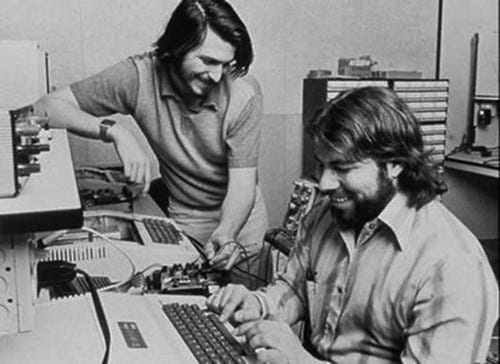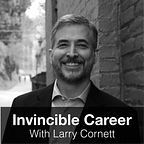
Would Apple be a $2 trillion company if Steve Wozniak and Steve Jobs had been more alike? I highly doubt it.
Thanks to my time working at Apple many years ago, I had the opportunity to experience the personalities of both Steves. I can tell you that they were very, very different people.
"The day we started Apple he changed. He changed his personality forever because he now was a founder of a company that had money. He wanted so strongly to find the way to be an important person in the world. He became very serious. He would always speak as though he was the one on top of running Apple. That was good with me. I was the shy engineer who wanted to go into the laboratory and keep inventing things and building them. I didn't want to run a company with politics and people pushing each other out."
— Steve Wozniak (source)
Jobs did seem larger than life. His famous “reality distortion field” was legit. You believed the grand vision he described. But, he was not someone you felt comfortable around, and he could be a terrifying leader (e.g., “Justify your existence!”).
On the other hand, Wozniak was a friendly guy who loved to joke around. He enjoyed telling us stories of the pranks he used to play. He loved building stuff and wanted to be left alone. He seemed happy to fade out of the spotlight and focus on his passion for education, gaming, and building new tech.
As strained as their friendship became later when Jobs started acting like a serious businessperson with a God complex, the complementary balance of strengths and differences between the two founders was necessary for Apple to succeed.
Jobs needed Wozniak’s quiet and focused creativity and engineering talent. Wozniak needed Jobs to boldly lead the company and market the hell out of their products.
At some point in your life, you too will seek to partner with one or more other people. You’ve probably already done it. That’s what it means to be an employee in a company. You don’t get hired to sit alone in a basement for years. You have to partner with your coworkers, manager, and other colleagues to get stuff done.
Sure, working solo has many benefits. I love it and have done it for years. But, I also know that I am limiting what I can accomplish by trying to go it alone.
“If you want to go fast, go alone. If you want to go far, go together.”
— African proverb
Partnering helps you achieve greater things. You’ll need to connect the unique “puzzle piece” of who you are with other complementary pieces to complete the full picture. That connection could be between:
You and an employer when you’re trying to find the ideal role that will take your career to all new heights.
You and a partner if you’re pursuing an entrepreneurial path and want to launch your first business.
You and a life partner when you’re ready to commit and build a life together.
I’m not going to get into how to find your life partner in this newsletter article. I actually did write quite a bit about that earlier this year. If you’re interested, you can read my Lessons from 30 Years of Marriage (Parts 1-3).
So, how do you find the right co-founder when you’re ready to start your own business?
How do you find great professional partners when you’re seeking your next career move?
Getting this right is important because co-founder conflict is one of the top reasons that early startups fail. Bad bosses and toxic coworkers (i.e., your “partners” as an employee) are two of the top reasons people quit their jobs.
Why bother partnering?
No single person is a complete picture. We're all puzzle pieces. We have holes in some areas (i.e., our weaknesses) and tabs in others (i.e., our strengths).
I’ve consulted with startups where the founders were too much alike. They had the same talents, skills, experience, and personalities. Both founders were engineers. They were both interested in being the CEO. Neither one of them knew anything about design, customer research, marketing, sales, or how to turn their cool technology into a product that a customer would want. It didn’t turn out well.
Sometimes very similar partners can make it work if they hire a great team that fills in their gaps and weaknesses. But, they’re still on a path to failure if both think that they should be the one who is heading up the company, managing the Board, speaking to investors, talking to the media, etc.
To succeed and complete the full image of your future, you need to combine your piece with others who complement and balance you. That includes:
Talents
Skills
Interests
Personality
Vision
Operational expertise
Leadership style
You need to fit together well. But, even when you do, a misalignment is still a recipe for ultimate failure. You need to make sure that you agree with what picture you’re trying to complete.
You’re not going to be happy if you try to place your “mountain scenery” piece into a puzzle that completes a photo of the Manhattan skyline. I hope you already know that’s true in personal relationships. It’s also true in professional ones.
What are your nonnegotiables?
Partnering with someone who complements you with their differences is essential. But, you do need to be similar enough to your partner in some ways so that you’re aligned on things that matter.
Even if your pieces fit well together, you may discover that you don't complete the same picture. For example, you want to build a lifestyle business that supports you financially and gives you enough freedom to enjoy your life outside of work. But, your potential partner is really ambitious and wants to create the next billion-dollar company.
She’s so driven that she’s ok with working 24/7 for years to make it happen. However, you can’t stand the idea of staying in the office until late in the evening and never seeing your family. I don’t care how well you complement each other; that partnership will not work out.
Questions to explore your nonnegotiables — where you need to be similar and aligned — might include:
Are you a product company, service company, or hybrid?
Are you both willing to sign documents that legally define the company, your roles, ownership, compensation, arbitration processes, etc.?
What is your vision of the future?
What do you want the mission of your company to be?
What should the company’s principles, values, and ethics be?
What size of company do you want to build?
What’s the ideal organizational structure?
Are you both going all-in on this venture, or can one person only contribute part-time?
How do you do your best work (e.g., all alone, together in a quiet room, with music playing, joking around while you work)?
How do you prefer to communicate (e.g., texts, Slack, email, phone, in-person)?
What is your ideal exit strategy (e.g., retire and sell the company, go public, get acquired)?
How do you ideally want the company to make money (e.g., are you ok with advertising revenue)?
What is your philosophy around spending money, handling profit and loss, and investing in the company?
How should important decisions be made?
How should disagreements and conflicts be resolved?
I founded a tech startup several years ago with co-founders and employees. I made sure to build the core team with people who had very different — but necessary — skillsets (e.g., design, back-end engineering, front-end development, mobile development, product, business).
We also had different strengths and weaknesses that balanced each other (e.g., ability to pitch investors, networking, attention to detail, big picture strategy, creativity, planning, financial acumen, optimism, pragmatism, enthusiasm, stability).
Importantly, we were all aligned on our vision for the company and our “Why.” We also had similar working and communication styles.
For example, the very talented designer (Hi, Sam!) and I shared a small office. We mostly worked quietly with headphones on when we had to crank on tasks. But, we also knew when it was time to chat, joke around, grab lunch, and celebrate a little on Fridays after a release. It all felt natural, and it was one of the best working experiences in my life.
When you're forming an entrepreneurial partnership, it's essential to find the right pieces that fit together and align to create a shared vision of the future. I think everyone understands that.
However, it’s also important when seeking a new employer and boss. You want to make sure that your piece fits into the vision, mission, talents, company culture, and principles.
For example, you will be miserable if:
You believe in data-driven decisions, but the company leans toward authority-based decisions (e.g., do whatever the CEO says).
You care deeply about the environment, but the company works with partners who don’t give a damn about the environment.
You enjoy an open, honest, and collaborative culture, but the company is highly political, full of secretive meetings, and cutthroat behavior is rewarded.
Seek out differences
We recognize similar puzzle pieces and feel an affinity. We have similar interests, life experiences, strengths, and failings. We often form deep friendships with people like this.
It might be tempting to try to partner with these comfortable and familiar pieces. People often want to work with good friends. Many entrepreneurs and founders have started businesses with friends who were classmates or coworkers.
It sometimes works out. But, it’s often a mistake if you are too alike.
You need to find pieces that fill your gaps. You need to find people who appreciate and need your strengths.
For example, perhaps you're great at creating something but terrible at sales and marketing. You're a talented, prolific artist. You crank out beautiful work every week to share on social media, but you're barely scraping by. You want to partner with someone to help scale the business.
Your ideal business partner shouldn't be another creator like you. Yes, you do want someone who will appreciate what you create and have the same long-term vision. But, more importantly, you want a partner who excels at sales and marketing, will help you find customers and grow the business, and is committed to helping both of you financially succeed.
While you’re creating the next work of art, they’re finding new opportunities to build an audience.
While you may be shy and unwilling to connect with people on social media, they know to nurture your super fans and enjoy the interaction.
While you hate discussing prices and trying to persuade someone to buy your work, they've found a creative way to monetize what you do so the fans are thrilled.
It’s a useful exercise to document your talents, skills, strengths, and likes. What are you really great at doing and enjoy doing? These become the positive tabs of your puzzle piece to complete the holes in a potential partner’s piece.
It’s just as useful to capture your weaknesses and dislikes. What are you not good at doing, and what do you hate doing? These holes will be areas you seek to fill with the tabs in your potential partner’s piece.
For example:
If you know that you’re better at big picture thinking and weak with operational details, you want to find a partner who has strong attention to detail and enjoys those operational tasks.
If you struggle with pessimism and feeling down makes it hard for you to be productive, find a partner who is more optimistic and can help lift you with their positive energy.
If you avoid conflict and hate negotiating with people, find a partner who doesn’t mind going toe-to-toe with folks when necessary.
Complementary Harmony Feels Magical
People have compared a professional partnership to marriage. A few have said that choosing the right business partner is even more challenging than choosing your spouse.
I don’t necessarily agree with that. But, there’s no denying that you’ll probably spend more time with your business partner, and the risks can be even greater.
However, when you get it right, it is pretty magical. There’s nothing like partnering with someone who gets you and completes you. With the right partner, you’ll discover how 1 + 1 = 3.
It comes down to being self-aware and deliberately seeking out the discomfort of partnering with someone different than you vs. a comfortable like-minded friend. You will thrive in your new venture (or job) when you partner with someone who genuinely complements you.
⬆️ Scroll to the top if you want to listen to my expanded discussion of this newsletter article 🎧
A way to support my newsletter
I know that not everyone is ready to become a paid subscriber. But, there is a great way you can support my work without spending any money:
📣 Recommending my newsletter on social media.
It only takes a few seconds, and it helps grow my business so I can continue making time to write it.
I'll even provide some copy and paste text to make it easy to share on Twitter, LinkedIn, Facebook, etc. Thanks in advance!
I've really been enjoying the Invincible Career newsletter by Larry Cornett (@cornett). If you want to get ahead in your career and you aren’t subscribed yet, you’re missing out.
https://newsletter.invinciblecareer.com
This week’s professional development challenge
⭐ Share Your Portfolio of Work
This challenge helps you keep your portfolio of work up to date. It makes sure that you’ve included your most recent accomplishments and are happy with how your talent is being represented. It’s also your chance to get some honest feedback from the community!
Larry Cornett is a leadership coach and business advisor who also hosts:
A free Slack community for ambitious professionals who want to create an invincible career.
A professional mastermind community for solopreneurs and entrepreneurs.
A free community for independent creators who want to make a living doing more of what they love.
He lives in Northern California near Lake Tahoe with his wife and children, and a gigantic Great Dane. He does his best to share advice that can help others take full control of their work and life. He’s also on Twitter @cornett.











